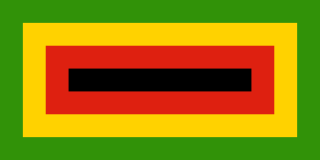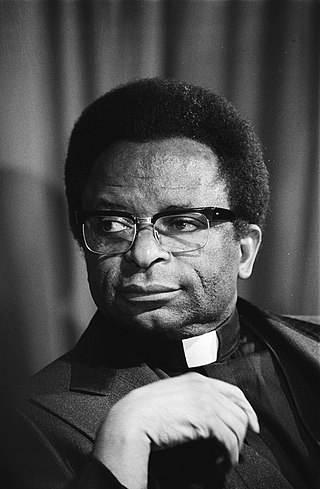Related Research Articles

The Gukurahundi was a series of mass killings in Zimbabwe which were committed from 1983 until the Unity Accord in 1987. The name derives from a Shona-language term which loosely translates to "the early rain which washes away the chaff before the spring rains".

The Zimbabwe African National Union – Patriotic Front (ZANU–PF) is a political organisation which has been the ruling party of Zimbabwe since independence in 1980. The party was led for many years by Robert Mugabe, first as prime minister with the Zimbabwe African National Union (ZANU) and then as president from 1987 after the merger with the Zimbabwe African People's Union (ZAPU) and retaining the name ZANU–PF, until 2017, when he was removed as leader.

Joshua Mqabuko Nyongolo Nkomo was a Zimbabwean revolutionary and politician who served as Vice-President of Zimbabwe from 1990 until his death in 1999. He founded and led the Zimbabwe African People's Union (ZAPU) from 1961 until it merged in 1987 with Robert Mugabe's Zimbabwe African National Union (ZANU) to form ZANU–PF after an internal military crackdown called Gukurahundi in western Zimbabwe, mostly on ethnic Ndebele ZAPU supporters.

Abel Tendekayi Muzorewa, also commonly referred to as Bishop Muzorewa, was a Zimbabwean bishop and politician who served as the first and only Prime Minister of Zimbabwe Rhodesia from the Internal Settlement to the Lancaster House Agreement in 1979. A United Methodist Church bishop and nationalist leader, he held office for less than a year.
The Northern Ndebele people are a Nguni ethnic group native to Southern Africa. Significant populations of native speakers of the Northern Ndebele language (siNdebele) are found in Zimbabwe and in South Africa.

Joseph Wilfred Msika, was a Zimbabwean politician who served as Second Vice-President of Zimbabwe from 1999 to 2009.
George Bodzo Nyandoro was a Zimbabwean politician and activist in the struggle to end white minority rule in Rhodesia. Nyandoro was one of the founders of the Southern Rhodesia African National Congress (SRANC) and served as the General Secretary of the Zimbabwe African People's Union.
The Southern Rhodesia African National Congress (SRANC) was a political party active between 1957–1959 in Southern Rhodesia. Committed to the promotion of indigenous African welfare, it was the first fully fledged black nationalist organisation in the country. While short-lived — it was outlawed by the predominantly white minority government in 1959 — it marked the beginning of political action towards black majority rule in Southern Rhodesia, and was the original incarnation of the National Democratic Party (NDP); the Zimbabwe African People's Union (ZAPU); the Zimbabwe African National Union (ZANU); and the Zimbabwe African National Union — Patriotic Front (ZANU–PF), which has governed Zimbabwe continuously since 1980. Many political figures who later became prominent, including Robert Mugabe and Joshua Nkomo, were members of the SRANC.
Tichafa Samuel Parirenyatwa was Zimbabwe's first trained black physician, medical doctor and the first vice-president of the Zimbabwe African People's Union (ZAPU). He rose to prominence during ZAPU's political struggle against the colonial administration in Southern Rhodesia.
Jason Ziyaphapha Moyo (1927–1977) was the founder of the Zimbabwe People's Revolutionary Army (ZIPRA).

Canaan Sodindo Banana was a Zimbabwean Methodist minister, theologian, and politician who served as the first President of Zimbabwe from 1980 to 1987. He was Zimbabwe's first head of state after the Lancaster House Agreement that led to the country’s independence. In 1987, he stepped down as President and was succeeded by Prime Minister Robert Mugabe, who became the country's executive president. In 1997, Banana was accused of being a homosexual, and after a highly publicised trial, was convicted of 11 counts of sodomy and "unnatural acts", serving six months in prison.
Charles Mzingeli (1905–1980) grew up on a Catholic mission station near Plumtree in Southern Rhodesia, now Zimbabwe. At the age of 14 he ran away to work on the railways, before moving to Bulawayo, where he became involved in the Industrial and Commercial Workers' Union (ICU), and worked with figures like 'Sergeant' Masotsha Ndlovu. The ICU, a radical trade union, started in South Africa in 1919, but spread into neighboring colonies in the 1920s and 1930s. In 1929 Mzingeli was sent to Harare Township at Salisbury as the ICU's organizing secretary. The ICU disintegrated in South Africa as well as in Southern Rhodesia in the 1930s, but it had pioneered black trade unionism in the latter, where it had played a major role in both urban and rural protests.
Benjamin Burombo (1909-1959) was a labor union leader and black nationalist in Southern Rhodesia, now Zimbabwe. Born in Buhera in Manicaland, he worked in South Africa, and then in Bulawayo, where he formed the British African National Voice Association in 1947. Better known as the African Workers Voice Association, the union was notable for its role in the 1948 general strike and campaigned against the 1951 Native Land Husbandry Act. The Act was intended to privatise communal lands. Burombo died at a relatively young age, his funeral was a major public event.
Lazarus Nkala, known in political circles by the nickname UMavava, was a Rhodesian trade union leader, activist, and revolutionary. Born in Filabusi in Matabeleland, he attended mission and government schools, and trained as a builder. He worked in Bulawayo, and became a union leader and African nationalist activist. In the 1950s and 60s, he served in leadership roles in the Southern Rhodesia African National Congress, National Democratic Party, and Zimbabwe African People's Union. He was detained in 1964 and, with the exception of a three-week period the following year, was held in continuous detention for the next ten years. Upon his release in 1974, he was named Organising Secretary of the ANC, and attended the Victoria Falls Conference as part of Joshua Nkomo's delegation. He died shortly after in an automobile accident while driving from Salisbury to Bulawayo.
Joseph Luke Culverwell (1918–1993) was a South African-born Zimbabwean politician and psychologist. Between 1981 and January, 1988, Culverwell was the Deputy Minister of Education and Culture of the Republic of Zimbabwe. In January 1988, he was appointed to the Minister of State in the President’s Office responsible for National Scholarships until 1992 when, for a brief period, he became the Deputy Minister of Higher Education.
Jane Ngwenya was a Zimbabwean politician.
Njini Ntuta was a Zimbabwe African People's Union (ZAPU) politician. He was deputy minister of mines in the first post-independence government but was sacked by President Robert Mugabe in a 1982 purge of ZAPU politicians. Ntuta was assassinated by members of the security forces acting on the orders of Colonel Flint Magama in 1984. At the time Mugabe's government blamed the murder on anti-government dissidents.

Daniel Nyamayaro Madzimbamuto (1929–1999) was a Southern Rhodesian activist who became a Zimbabwean politician and administrator.

Callistus Dingiswayo Ndlovu was a Zimbabwean academic, diplomat, and politician. He joined the Zimbabwe African People's Union (ZAPU) in 1963 as a teacher in Matabeleland, and went on to serve as its representative to the United Nations and North America in the 1970s. After Zimbabwe's independence in 1980, he was a member of the House of Assembly from 1980 to 1985 and served as a senator from 1985 to 1990. He left ZAPU and joined the ruling ZANU–PF party in 1984.
References
- ↑ "Masotsha Sergeant Ndlovu: A Biography," Retrieved 2019-05-09.
- 1 2 Mashingaidze, Terence M. (2 February 2012). "Ndlovu, Masotsha (1890–1982)". In Akyeampong, Emmanuel Kwaku (ed.). Dictionary of African Biography. OUP USA. pp. 421–423. ISBN 9780195382075.
- ↑ Pathisa Nyathi, 1998, In Search of Freedom: Masotsha Ndlovu, Harare: Longman